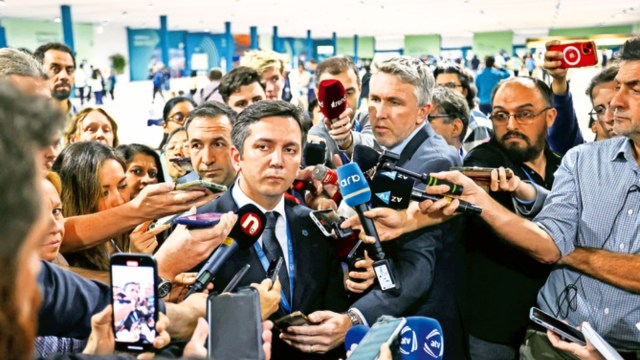COP29 in overtime as countries reject $250-billion offer
The conference has now gone into extra time as developing countries made a concerted effort to extract a better offer.
 COP29 lead negotiator Yalchin Rafiyev in Baku, Friday. (Reuters)
COP29 lead negotiator Yalchin Rafiyev in Baku, Friday. (Reuters)On the final day of the COP29 negotiations Friday, the developed countries revealed their offer on climate finance — a mere 250 billion dollars a year from 2035 — angering developing countries which have been asking for 1.3 trillion dollars a year. The conference has now gone into extra time as developing countries made a concerted effort to extract a better offer.
The proposal, part of a new draft agreement that came out Friday, did acknowledge the 1.3-trillion dollar demand but called on “all actors”, meaning both developed and developing countries, to “work together” to enable scaling up climate finance to this level. Essentially, it means the developed countries took no responsibility for attempting to raise the 1.3 trillion dollars.
The Paris Agreement puts the onus of generating climate finance solely on developed countries. As of now, they are under commitment to raise 100 billion dollars per year, a target that they have most not met. The Paris Agreement has a provision that says a new higher figure should be decided before 2025, a goal the countries assembled at COP29 are trying to achieve.
It is not just the proposed amount that was underwhelming. While developing countries have been demanding that a bulk of climate finance be raised from public sources, and disbursed largely in the form of grants or concessionary loans, Friday’s proposal talked about raising 250 billion dollars from all sources — private and public, bilateral and multilateral.
Also, the 250 billion dollars is proposed to be provided only from 2035, after a gap of 11 years. This means that in the meanwhile, the developed countries would continue to provide only the 100 billion dollars they are currently obligated to raise. In 2009 too, when the developed countries had first proposed the 100 billion dollar figure, they had promised to mobilise it only from 2020.
The small island countries rejected the proposal, saying it was an example of asking parties how low they could go in climate ambition. “This text will not be adequate to fully implement the Paris Agreement, to truly drive action to hold the 1.5º C limit. This is unacceptable,” the countries said in a statement.
Civil society organisations and experts also lambasted the draft text. “The 1.3 trillion USD number is at best a sham. Just the investment in renewable energy technologies in the developing countries was 544 billion USD in 2022 itself. This is a bad deal for the developing world,” Vaibhav Chaturvedi, senior fellow at Delhi-based Council on Energy, Environment and Water, said.







